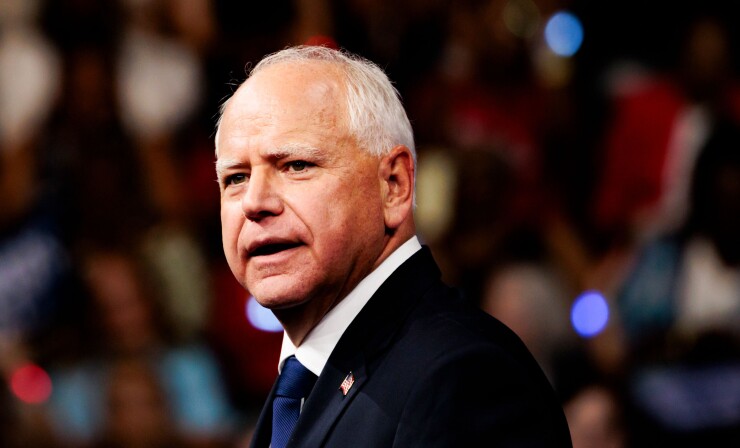As governor of Minnesota, Tim Walz has proposed some sweeping investments, including a $3.3 billion bonding bill that would have been the largest in the state's history, and a $1 billion infrastructure package earlier this year.
Some who've watched the evolution of the governor's approach say the new Democratic nominee for vice president is a veteran of partisan battles and as a candidate for national office, he benefits from the pragmatism he's honed as governor and the knowledge of Washington he gained representing Minnesota's 1st district in the House of Representatives from 2007 to 2019.
"The [$3.3 billion] proposal that the governor put in front of the legislature is progressive and goes a long way toward fixing a lot of infrastructure items that, over time, have not had the attention that they perhaps needed," Barry Fick, executive director of the Minnesota Higher Education Facilities Authority, told the Bond Buyer this week about the bonding measure

The bond proposal involved $1.9 billion in general obligation bonds and $1.4 billion in other funding sources such as appropriation bonds, trunk highway bonds, user-financed bonds and general fund and trunk highway cash.
A spokesperson for Minnesota Management and Budget Commissioner Erin Campbell confirmed that the $3.3 billion total was the largest governor's recommendation amount Minnesota has on record. The goals of Walz's proposal were to boost infrastructure asset preservation, advance equity and environmental stewardship, support housing and combat homelessness and preserve roads, bridges and water systems, the spokesperson said.
Minnesota Management and Budget officials
Minnesota's Democratic-Farmer-Labor party gained a trifecta in November 2022 when they gained control of the state Senate, but because bond bills require a 60% supermajority the Democrats lack, Walz still needed Republican votes, as he did in his first term, when the GOP controlled the Senate.
In May 2023, the legislature passed a nearly $2.6 billion infrastructure bill that, even downsized from Walz's proposal, was still the largest infrastructure measure in Minnesota history. It included
In January, Walz proposed another roughly $1 billion of public works spending, including $819 million of general obligation borrowing, but the bonding bill
Management and Budget spokesperson Marie Hinton said that bill focused on preserving infrastructure, investing in housing and the environment, supporting public safety and shoring up water and transportation infrastructure. She noted that because "capital budget assets will benefit Minnesotans for years and decades to come," most of the capital budget is financed through GO bonds.
Minnesota carries triple-A ratings from Fitch Ratings, Moody's Ratings and S&P Global Ratings after
In affirming its rating ahead of a $1.6 billion GO sale
"There definitely is partisan wrangling, and the last legislative session ended in some discord because the Democrats with their majority managed to get a lot of large omnibus bills passed in the last hours of the legislative session," Fick said. "So I think there's still some concern on the part of the Republicans about that. At the same time, there were a lot of big-ticket items… [that] certainly were helpful to improve the overall social climate of the state. And the state still has a pretty good business climate."
On Wednesday, state Sen. Justin Eichorn, R-Grand Rapids, released a statement about the 1,400-page omnibus bill passed at the tail end of the legislative session and a lawsuit filed Friday by UnitedHealthcare over a ban on for-profit HMOs running Medicaid plans that was included in the bill.
"This lawsuit is not surprising to anyone who witnessed the disastrous end to the 2024 legislative session,"
Senate Minority Leader Mark Johnson, R-East Grand Forks, Assistant Minority Leader Julia Coleman, R-Waconia, and Assistant Minority Leader Karin Housley, R-Stillwater, did not respond to multiple requests for comment. But Housley, who is ranking minority member on the Senate Capital Investment Committee, told
In January, Housley
"I think the governor is most likely going to be a moderate [in national office]," Fick said. "He's a practical individual, and it will be, 'What can we get done that is workable for the public?' I would anticipate he's willing to be cooperative with Republicans… I think he'll go for the 'what's possible' stuff."





